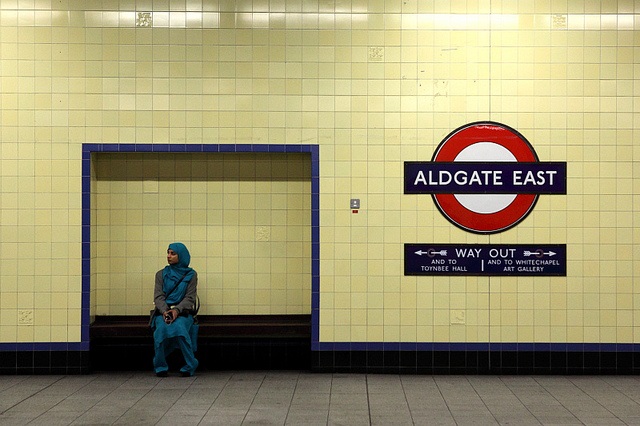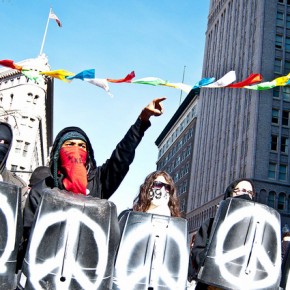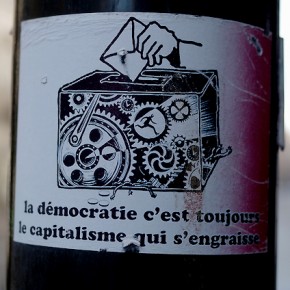UKIP Daily contributor Byron Sanford has written a revealing article called “Moderate Muslims Must Vote for UKIP.” Admittedly, I knew it would be offensive from the outset. After all, Sanford wrote a piece a few weeks ago that called halal Subway sandwiches “an affront to the common man.”
There is more to Sanford’s most recent piece than simple Islamophobia, however. It is important to keep pace with the European right’s ability to adapt its rhetoric to new circumstances. While the Subway piece is relatively easy to dismiss, this talk of “moderate Muslims” is much more thoughtful, in its repackaging of xenophobia. It also comes during a wider party shift, through such initiatives as Gerard Batten‘s proposal that British Muslims should sign a charter that condemns the parts of the Qu’ran that espouse “violent, physical jihad” as “inapplicable, invalid, and un-Islamic.”
The United Kingdom Independence Party has been enjoying a surge in popularity leading up to European Parliament elections. This owes primarily to how its dual brand of anti-politics and racism appeals to voters who are exhausted by the failings of Labour and the Tories. Its most enthusiastic supporters are working and middle class British whites who have been squeezed by austerity, and are so alienated by the Westminster elite that many usually don’t even vote.
However, these voters are insufficient to propel it to the status of a major party. If UKIP wants to be more than a short-term protest vote for disenchanted whites, then it needs to pay lip service to diversity, in the same way that France’s National Front has reached out to Jewish voters. This may mean that it loses some voters along the way, but none of any consequence.
There is already talk of UKIP shifting leftwards on the economy. Its leaders have also recognized that crude Islamophobia is not going to win it major cities like Manchester and London which boast substantial, middle class Muslim populations. Rather, this talk of “moderate Muslims” is an attempt to reach out to those already in the Tory camp, such as Sajid Javid and Sayeeda Warsi, who, despite being targeted by Conservative anti-pluralism rhetoric, find themselves at home in right-wing political circles.
Sanford’s rhetoric is thus familiar. Reading him, we encounter more-or-less the same discriminatory imaginary that we have come to expect from UKIP. It has just been re-branded as a struggle between something vaguely defined as “radical Islamism,” and “all those fundamentally opposed to it,” which presumably includes ‘tolerant’ British Muslims, such as those who vote Conservative. Yet, there are some differences.

UKIP defines the Muslims that it seeks as allies against Islamists. Sanford describes them as liberally-minded (“moderate Muslims are being pushed away for collaborating with humanists,”) and law-abiding citizens (“there are many decent Muslim men and women throughout Europe that obey the laws of their host country, and do not spread hate, or preach terror in the streets.”) What Sanford means by “humanists” is of course subject to question, as is his employment of the term “host country.”
Consistent with UKIP rhetoric, Sanford’s language, for those on the other end of the spectrum, those “radical Islamists,” is viciously intolerant, and inciting. He laments that “40% of Muslims living in Europe want to enforce the Sharia,” a false accusation, which is typically trotted out to frighten non-Muslims, and warns that the problem “will continue to grow drastically if unlimited numbers of migrants are permitted to come to Europe in migratory waves.” Classic UKIP, basically.
Here is where the rhetoric gets really dangerous, though. UKIP isn’t just using Muslim tokens to don a more liberal public face. It is also playing off a major class division among Muslim immigrants in the West, one that is usually overlooked by analysts outside of the community.
This new UKIP idea of the Islamist threat is no longer all Muslims. It is specifically newly-immigrated Muslims. The rhetoric is meant to appeal to more enfranchised Muslim communities that are more likely to be secular, cosmopolitan, and integrated. These are Muslims who genuinely feel like they are from the United Kingdom. There are Muslims like this all over the Western world, including me, a Pakistani-Canadian, from Saskatchewan.
UKIP knows that the dominant way many of us have responded to the War on Terror is to distinguish ourselves from our increasingly right-wing ancestral countries, partially out of genuine conviction, partially out of fear of disenfranchisement. For instance, there is a huge number of Pakistanis in the Diaspora who feel the need to compulsively dismiss Pakistanis. This isn’t exactly new, and is especially the case if they are second and third-generation descendents of professional immigrants. The War on Terror has simply intensified this reflex in a new context.
These Muslims tend to be more conservative in their political leanings, alienated by seemingly archaic social policies in countries like Pakistan, and overly eager to distinguish themselves from the working-class religiosity of other Muslims, in the West. Taking after the Tories, the British version of this is the community that UKIP seeks to capitalize upon as it expands its voter base.

Ideologies like Sanford’s are basically telling us that Muslim immigrants are the Muslims we hate, and that, as more enfranchised immigrants, we should become allies in a quest to keep them out. Which other Muslims could possibly find the find these statements appealing?
This percentage is higher among the Muslim youth, and will continue to grow drastically if unlimited numbers of migrants are permitted to come to Europe in migratory waves. The majority from Muslim nations will unfortunately be Islamists, and they will further cause tensions, not only with the indigenous populations, but also with the settled immigrant communities.
[…]
If you want to protect not only the indigenous populations and the non Muslim migrants, but also the moderate Muslims, then vote UKIP, and demand a halt to the entry of all Islamists, who are without a doubt a direct threat to the security and stability of the State.
Could it work? Not in this election, and probably not after that, either. British Muslims aren’t likely to forget that UKIP has already spent a great deal of time protesting against halal businesses in the country. UKIP’s branding amongst British minorities is so overwhelmingly racist that the few South Asians and Jews it attracts will do nothing to make it seem more tolerant.
My fear, though, is that rhetoric like this will eventually convince minorities to take a chance with populist parties like UKIP, and grant them the legitimacy they need to break into the political mainstream. It would leverage a class-based dislike of Islamists that appeals to Muslims publicly, while relegating the racist basis of such claims to the Anglo-supremacist private sphere.
Readers may find this prospect silly, but it isn’t a huge leap from what is already occurring in Diasporic Muslim communities. The Diaspora is frequently a battleground between highly ritualistic Muslims, and those who look down upon them as wealthier and ‘more Western’ members of the community. I have noticed this to a particularly exaggerated degree in the Iranian Diaspora. There is a reason that many Western-minded Iranians will go so far as to identify as “Persian” to sequester themselves in a completely different identity.
Additionally, some semblance of this is already being politicized in nearly every Muslim-majority state. Moderate and secular elites in countries like Pakistan are constantly told that they need to support any violent means for preventing a hostile takeover by the Islamist rabble. That is why so many of them supported General Pervez Musharraf‘s coup in 1999. It is also currently a mainstay of General Abdul Fatah al-Sisi’s efforts to consolidate the military’s power in revolutionary Egypt, and in the past, was done to spectacular effect by the Shah in Iran.
The deepest tragedy for me, though, is that this further divides an already deeply fragmented Muslim polity. This is the type of behavior that further enrages desperately embattled non-elite Muslim minorities, and in the absence of left-wing alternatives, pushes them towards Islamic militarism.
Photographs courtesy of Roberto Tim and reway2007. Published under a Creative Commons License.





